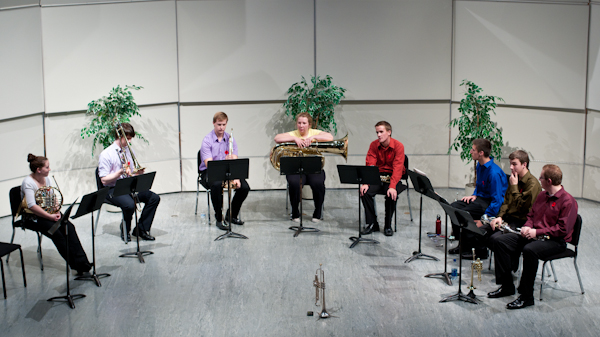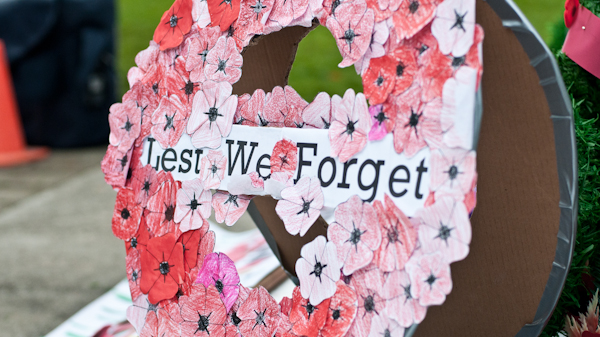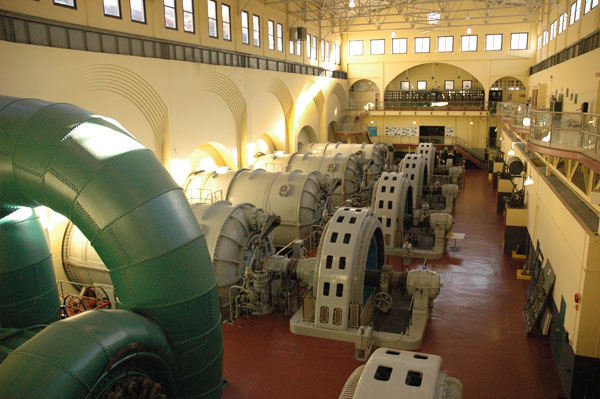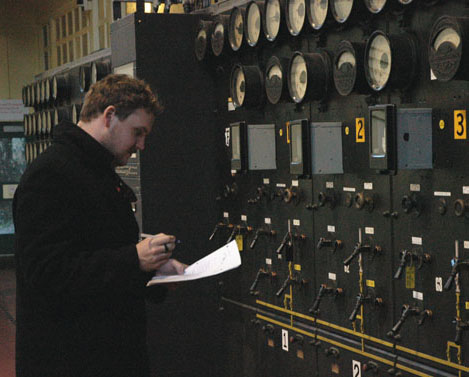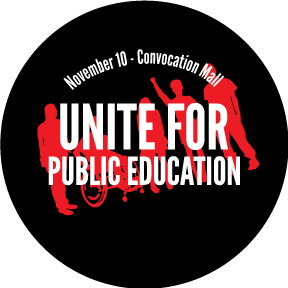When Mozart met the Godfather
November 12, 2010 by Max Hirtz · Leave a Comment
Kwantlen’s brass ensemble played pieces by Beethoven, Mozart, Verdi and others as part of Music at Midweek, on Wednesday, Nov. 5 at Kwantlen’s Langley campus.
The ensemble — four trumpets, two French horns, two trombones and a tuba — had been preparing for the performance since September under conductor Thomas Shorthouse, principal trumpet with the Vancouver Opera Orchestra.
“He, being a trumpet player, he’s the trumpet teacher, so any trumpet players here get one-on-one lessons with him,” said Adam Junk, one of the four trumpeters.
Junk wrote an arrangement specifically for the performance, called Papa Tom’s Pizzeria. The piece featured excerpts from the Godfather theme and other Italian-flavoured songs.
The free show was part of the Music at Midweek series of musical performances put together by Kwantlen’s music department. Each Wednesday, until the end of the semester, a different ensemble performs for about 45 minutes in Kwantlen Langley’s auditorium at 12:15 p.m.
Some audio excerpts from Wednesday’s performance:
[audio: Grand.mp3]
Grand March from Aida by G. Verdi, arranged by K. Snell
[audio: Symphony.mp3]
Symphony #7, 2nd movement by L. van Beethoven, arrangement by R. Larden
[audio: Queen.mp3]
Queen of the Night Aria by W.A. Mozart, arranged by T. Shorthouse
[audio: Papa.mp3]
Papa Tom’s Pizzeria, featuring excerpts from traditional Italian songs and the Godfather theme, arranged by A. Junk
Kwantlen Students reflect on Remembrance Day
November 12, 2010 by Max Hirtz · Leave a Comment
Do you think that Remembrance Day is losing its significance?
Mystica Lopez De Leon: “Maybe because more veterans are going, and then they’re not really here to remind us of what’s actually happening. But then, I guess we should look to the new generation that’s fighting elsewhere.”
Ryan Calasin: “I do think it has, because most of my friends, they just studied, they just did their homework, just partied last night.
Peter Coombs: “It’s very significant. From what I saw in the media, there was a lot of young people showing up. I don’t think it’s lost its effectiveness.”
Colin Pearson:”It was a personal day for me. My parents are at an age where they did participate in WWII… other than that, it was just a holiday-type day.”
Jack Yao: “I don’t know anybody who celebrated it, but I see a lot of people wearing the [poppy].”
Kwantlen vs. Langara: Women’s BCCAA final
November 10, 2010 by Kyle Benning · Leave a Comment
The Kwantlen Eagles qualified for the BCCAA final after winning their previous matches against Quest University and Vancouver Island University.
The women’s team were set to play local rivals Langara for the provincial title with the winner advancing to nationals.
Langara beat Thompson Rivers University and UBC Okanagan before playing the Eagles in the final.
Green Wednesday back at Langley this week
November 8, 2010 by Jocelyn Gollner · Leave a Comment
Another round of Green Wednesdays at Kwantlen is almost here.
This Wednesday, the School of Horticulture and the Green Ideas Network will be showing “Dirt: The Movie” at the Langley Kwantlen campus.
Gary Jones, Horticulture Instructor at Kwantlen, says, “It’s really a time for some informal education around issues of sustainability and it provides a venue for people to come together to discuss these things in a very informal setting.”
Typically, a Green Wednesday begins with an environmentally-themed movie. Then there is a break, where people can have something to eat and drink, before door prizes are awarded. The door prizes are from the event’s sponsors: A Bread Affair and Ladybug Organics.
The rest of the evening is left open for when there is a guest speaker, such as last month when the movie makers of “The Clean Bin Project” arrived to talk and answer questions at the event.
“We try to have some take-home action points as to what we can do in terms of personally at home or in our individual communities to make some changes,” Jones said.
An average of somewhere between 50 and 60 people attend the monthly Green Wednesdays, but Jones said that this number is steadily increasing.
“At the last event, which was the first of the season, we had 130 people,” Jones said.
This Wednesday, as well as showing the short 40-minute film “Dirt: The Movie,” some of the movie’s special features will be shown.
“I want to show two of them in particular,” Jones said. “One is about landscape planning and town planning, and how that effects soil and how that affects community. And the other one is about schools and bringing education around soil, food production, sustainability and food security into the classroom.
“I’d like people to go away with something that they can actually think about doing.”
Green Wednesdays are held at the Langley Kwantlen campus in Room 1325, with doors opening at 6:30 p.m. and the movie starting at 7. Admission is by donation.
Video: Who pays when you’re on a date?
November 8, 2010 by Jocelyn Gollner · Leave a Comment
Jocelyn Gollner, Miranda Gathercole and Sarah Casimong explore what Kwantlen students think about traditional gender roles in dating. Students voice their opinion about what they think about the expectation of guys having to pay on dates and whether it’s out of a woman’s place to be forward.
Environment students embark on a dam field trip
November 7, 2010 by Stu Gallacher · Leave a Comment
Physics students from the environmental protection technology program at Kwantlen woke up at the crack of dawn on Thursday for a field trip to the hydroelectric dam at Stave Falls.
Eight second-year students and one professor arrived in the Richmond campus parking lot to board school bus for a 7:30 a.m. departure to Mission where the dam is located.
The original Stave Falls dam has been out of commission since 2000, but remains open to the public as a museum, which provides educational and entertaining tours.
“I enjoyed the tour and the dam was interesting, but it was an early time for a field trip,” says Neil Brooks, who is a second-year student.
“It’s all about learning application and seeing real life examples of what we study in class,” says John Currie who is also a second-year student.
The EPT students have been studying an array of alternative energy sources, conducting in-field research and collecting data for analysis, including their most recent garbage audit of the Richmond campus.
“We’re learning about various sources of energy that are economical for B.C. We can’t do nuclear power because we’re too close to a fault line,” Currie said.
“You have to assume that an earthquake will happen, and with a power plant a serious blast could occur,” Brooks added.
Currie points out that aside from fossil fuel, wind, solar and hydro are the most feasible and environmentally friendly sources of alternative energy. However, solar has its setbacks, “It’s not the way to go,” said Currie.
“Solar energy isn’t an efficient source because of our weather and latitude. The sun’s rays hit us at a low angle and it’s not always sunny. It’s different if you’re in Arizona or the desert,” said Brooks.
Currie and Brooks agree that for B.C., dams are the most effective and sustainable way to produce electricity. “When you consider the density of water, you realize how much power it can generate when it falls. One cubic meter of water weighs ton,” Currie said.
“They’re planning to build another dam in Peace River. All that energy contributes to the grid across North America,” Brooks said. “Energy that we buy.”
Ending an obsessive relationship is all about finding balance
November 7, 2010 by Amanda Punshon · Leave a Comment
by Meagan Gill and Amanda Punshon
Boundaries make everything better — especially when it comes to relationships. Obsessive relationships are characterized by a lack of respect for healthy boundaries in one or both partners’ lives, according to Robyn Rushford, a Kwantlen counsellor, and Rob Hadley, a hypnotherapist with Vancouver Hypnotherapy.
Rushford explains obsessive relationships as being “like an addiction. So when we think in terms of addiction language, does the addiction have control over you? Are you doing things in your life because of the addiction that you would not normally be doing? So one of the questions you would want to ask is, is the relationship good for you or bad for you?”
These relationships often fall into one of two categories: where only one of the partners is addicted, or where both partners are.
When one partner is addicted:
When we think of obsessive relationships, we often think of stereotypes from the movies: stalkers, controlling husbands or nerds who are convinced the most popular girl in school is in love with them.
According to Rushford, it’s true that addictive relationships aren’t always relationships in the conventional sense. Sometimes they are relationships that have ended, and sometimes they never even began. But it’s not unheard of for one partner in a functioning relationship to become obsessed, as in the case of the controlling husband.
Rob Hadley, a hypnotherapist with Vancouver Hypnotherapy, says that social media has made it even easier for people to feed their relationship addictions. “Someone who is very obsessed with a partner, or an ex-partner, they can suck up hours and hours of their time and we’ll be asked, ‘How do I get over this?’”
“Often people in your life will comment that they see things in the relationship that don’t seem to be healthy for a person,” Rushford says. “So that could be spending an awful lot of time fantasizing, thinking about the relationship, pursuing a person. And I think now, with social media, that we see that quite frequently. It could be using Facebook in a way, almost like stalking kind of behaviour. Of texting people persistently, calling people.”
Social media stalking can also be translated into the real world. Rushford says it’s not uncommon for addicted people to engage in behaviour such as “following people, of planning their life around somebody to the degree that could include maybe picking your courses because you know that person is going to be in the courses. Planning your route based on what that person’s schedule is going to be like. So that person becomes the focus of everything in your life.”
Being the target of an obsession, especially if you’re in a relationship with the person, can have negative effects. Hadley says that the loss of self-esteem is common in people who have been the subject of an obsession.
To combat that, Rushford says the most important thing you can do is establish clear boundaries: maintain your own circle of friends; do things on your own; emphasize the importance of your needs.
“I think that would be a really challenging relationship to have,” she says. “And I don’t know how well they work out.”
When both partners are addicted:
Sometimes it’s not just one partner who is addicted. At the beginning of a relationship, Rushford says, it’s natural for the couple to become infatuated with each other to the exclusion of the rest of the world. It’s all about the degree of the infatuation — how long has it lasted? are grades or jobs or family responsibilities suffering?
Usually, she says, the couple will rejoin the world eventually. But if they don’t, you’re left with two people who are okay with their relationship, even if it’s “not necessarily healthy. Not all relationships are healthy.”
If you’re not okay with the intensity of your relationship, Rushford says the first thing you should do is take time to re-evaluate your goals and your life. If school is your priority and you’re not able to focus on it, you might need to step back from the relationship.
On the other hand, if you have a friend or a family member who’s in a relationship like that, it’s important to give them space, she says. All you can do is “be there for your friend, to say, ‘Hey, I care about you.’ And to have your own boundaries as well…What’s okay with you? Is it okay that your friend disappears for four months and then knocks on your door one day? I don’t know what the answer to that is. It would be all about what works for you.”
“In an ideal world, I guess you’d hope to be able to maintain some kind of a relationship but respect that there’s a change that’s happened. You might not have as high a place in their life now but, ideally, too, if you can make time for your friends, you’re going to be better off.”
In either situation:
In both Hadley and Rushford’s view, becoming addicted to a relationship and being attracted to addictive personalities come from the same place.
For Hadley, people “learn our relationship behaviours often from our parents. If you look at someone who’s had a bit of trouble in relationships, when you look at how his or her parents manage their relationships, often what you will find is that they’ve had some trouble managing relationships as well.”
He views early childhood as the formative time in a person’s life. If something traumatic happened to a child, it will affect adult relationships.
Hadley also says that trust is paramount in relationships. “What it comes down to is how much one partner trusts the other to just do their own thing and to be where they say they’re gonna be,” he says. “So if you’re looking at early signs that it may not be going right, look at the levels of trust.”
Rushford takes a different view. She works from an attachment theory base, which means that she feels “that obsessiveness in relationships is often about the anxiety of being rejected or of being abandoned, and it becomes so rooted in your experience that you do everything to maintain this attachment.”
Both the addicted person and their partner may have this anxiety, and wounded people are often drawn to wounded people.
“It’s about filling a void that is in yourself, and I think at the end of the day, that’s probably what we need to focus on,” she says. “What is that void, that place you feel the relationship is going to fill in you? And often, I think it is an attachment wound, something that didn’t go well in your development with the attachment figures in your life. Abandonment, rejection, those kind of things.”
What to do:
If you find yourself in an addictive relationship, there are a few easy ways to break its grip on your life.
First, be willing to talk about it. Rushford says that “when you can bring something out in the open, when you can start to talk about it that’s the very beginning of something losing its power.”
Second, make your lifestyle as healthy as possible. Both Rushford and Hadley say that when your lifestyle is balanced and healthy, it makes it easier for you to cope with the stresses in your life. “We will get them exercising, improve their diet, get them sleeping better, give them some general anxiety tools, so they’re not weakened by the experience of the relationship. So they are in their best shape to deal with the post-relationship landscape,” says Hadley.
Vancouver Hypnotherapy uses a three-aspect approach to assess a person’s risk factors: how stable is their work/security situation? What do their home, family and relationships look like? How do they look after themselves emotionally and physically? If the relationship is healthy, all of those factors will be in balance, Hadley says.
Rushford uses different language, but she says basically the same thing: balance is important. When one part of your life falls out of orbit, it makes it harder to keep the rest on track. Also important, she says, is building a tolerance to the anxiety associated with your addiction. Saying no gets easier every time.
Third, seek help. Psychotherapy and hypnotherapy take different approaches to dealing with addictive relationships. It’s up to you to decide which best fits your situation.
The main difference between hypnotherapy and psychotherapy is that, in psychotherapy, a counsellor will discuss your issues with you, attempt to find their source and help you fix them. But they won’t push you in a specific direction. In hypnotherapy, on the other hand, the therapist will discuss your issues, but they will also tell you to end the relationship if it continues to be unhealthy. It’s important to note that in both approaches, the therapy will be conducted differently by each individual therapist.
Further reading:
Kwantlen Counselling has two leaflets that might be helpful. One’s called Addictive Relationships, the other Committed Relationships and School.
Also available in the counselling office or at your local library are these books:
- Obsessive Love: When it hurts too much to let go by Susan Forward, PhD, and Craig Buck.
- Boundaries and relationships: knowing, protecting and enjoying the self by Charles K. Whitfield, M.D.
- Loving him without losing you: how to stop disappearing and start being yourself by Beverly Engel.
SFU to rally for education: Will Kwantlen?
November 7, 2010 by Hayley Woodin · 1 Comment
Simon Fraser University will host a student-led education rally Wednesday to protest funding cuts to universities and issues surrounding student debt.
The SFU Community Coalition aims to raise awareness about the current state of education funding in B.C., in the hopes of making post-secondary education a high priority in B.C.’s next provincial budget.
The Nov. 10 rally, scheduled for the Convocation Mall at 3 p.m., is an offspring of the Canadian Federation of Students’ student debt campaign, which focuses on similar issues and unites students in an attempt to induce legislative education reforms.
Unlike other universities across Canada, Kwantlen has yet to speak out about those issues.
“The KSA will have a campaign, it’s just a matter of to what extent students grasp it and to what extent we are able to use our capacities to the fullest in the KSA,” said Bradley Head, the KSA’s director of academic affairs, and the chair of the academic issues committee.
The capacity of the KSA is currently limited: internal politics have rendered council ineffective since the start of the fall semester, and there haven’t been any official meetings since September, according to Head.
“We’ve been in discussion with SFU a little bit, but not to the extent where we can do any big campaign,” he said.
Head said that the KSA would like to look into receiving more operating funds and grants for the university, increasing class sizes and making student loans more accessible.
These are similar to the issues being brought up on Wednesday on SFU, along with reducing student loan interest rates, and increasing funding to StudentAid B.C., a government program that helps students with the cost of post-secondary education.
The provincial budget will be finalized mid-November, so students have limited time to voice the changes they’d like to see in the 2011 budget.
But change is possible. And with Premier Gordon Campbell’s recent announcement that he will be resigning, there may be hope for increased funding towards education.
“I think that [with] the change in premier, there’s a lot of positive that could come from it for the school,” said Head.
“Depending on who is placed in that position, their opinions based on student debt and the way the education system’s currently funded, [it] could massively change any chances the student unions have of decreasing or maintaining current tuition,” Head speculated.
Head said he hopes the issue be brought up within the KSA in the next two to three weeks.
“[But] that’s if council meets,” he said. “If council doesn’t meet, there’s no way to actually do the campaign.”
Audio: Sonic poet paints scenes with sound
November 6, 2010 by Jeff Groat · 2 Comments
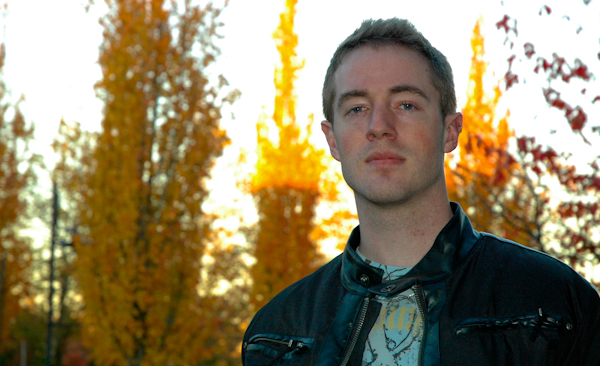
Kwantlen creative writing student Mark Funston crafts new sounds using old poetic forms. His style of sonic poetry is a cousin of slam poetry, and Funston likes to add his own twist using traditional forms such as the villanelle or the triolet. Each has a unique internal rhyme scheme that adds to the “sonic” qualities of his work. Photo by Jeff Groat
[audio: SonicPoetry.mp3]
Ever since the 2010 Olympic Winter Games in Vancouver, people have been tuned into the world of contemporary poetry after Shane Koyczan’s “We Are More” performance. Kwantlen Student Mark Funston isn’t a slam poet, but his work is like Koyczan’s in that its author’s voice breathes it to life.
Sonic poetry is the name Funston uses for his work, and it is phonetically charged with both old and new style. By playing with classical poetic forms, with rigid rhyme schemes and structures, he is able to add an extra layer to his work.
Funston has completed his minor in creative writing at Kwantlen, but is not considering launching a career as a professional poet.
Negotiations over, U-Pass program to go to vote
November 6, 2010 by Jeff Groat · 1 Comment
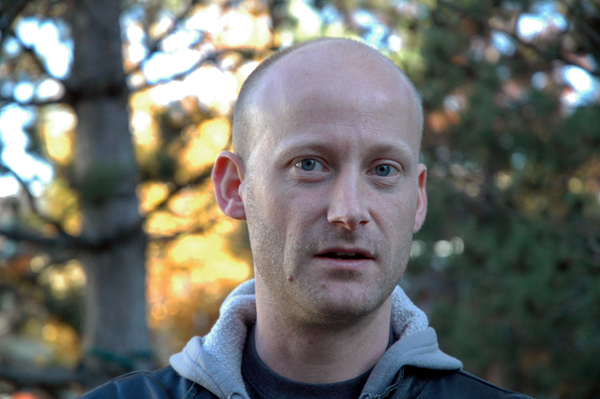
KSA director of external affairs, Matt Todd, is concerned that students will need to wait even longer for a U-Pass. Todd hopes the U-Pass referendum will be held in February. Photo By Jeff Groat
A week ago, the Kwantlen Student Association postponed a referendum on the U-Pass as negotiations hadn’t reached a conclusion before a target date set by TransLink set. This week, the negotiations were finalized, pending working out details in a couple areas.
The result is a recommendation that students vote in February 2011 to accept or reject a U-Pass.
One area that still needs to be worked out is the wording of the contract to include Adult Basic Education (ABE) students in the U-Pass program. ABE students are mature students who did not graduate from high school but are upgrading some education to continue in university education. Originally, these students were not included in the U-Pass program, since ABE credits do not count as regular full-time credits like most other courses do.
Another, more finicky area, concerns students who withdraw from courses after they receive a U-Pass.
Hypothetically, it may be possible for a student to register for one class, receive a U-Pass, then withdraw from that class. In this case, TransLink would charge Kwantlen an additional $50 to make up the difference between a U-Pass and a regular one-zone buss pass, as this person would no longer be considered a student at Kwantlen.
The problem lies in the fact that Kwantlen does not have the means to collect this fee from the student, and is wrestling with the question of whether a student can be prevented from registering for classes before paying back the institution.
Matt Todd, the Kwantlen Student Administration’s director of external affairs, said, “the university has this dilemma of would we really prevent somebody from furthering their post secondary education because they didn’t pay for their U-Pass?”
At the table, Kwantlen failed to negotiate an increase in the exemption limits from one to five per cent, something that Kwanten believes is a problem unique to the Fraser Valley.
“Because most of those students [in the valley] go to Kwantlen, we feel that this is a problem that is special to Kwantlen,“ Todd said.
The student association expects roughly five per cent of students will want to be exempt from paying for and using their U-Pass, because of a lack of reliable and frequent transit access in some communities of the valley. These students would be forced to pay for a U-Pass that they are likely to not use.
“We don’t think that’s fair to students,” Todd said.
According to Todd, there are two options: “Better service or exempt those students.”
If approved, the U-Pass system will be a two-card system for at least two years or until TransLink implements a smart-card electronic fare system.
This means the KSA will incur the costs of redesigning new student ID cards that include some features required by TransLink, as well as the U-Pass card itself. There are other expenses for implementing the U-Pass, such as hiring staff to deal with the new program, training staff and buying new software. All these costs are paid by participating schools and only an increase in student fees would pay for this.
“They have come to the table, they’ve made a big investment, but I don’t think [the province] realized how much it was going to cost,” Todd said.
Todd is recommending that the referendum be held in the first week of February next year.

